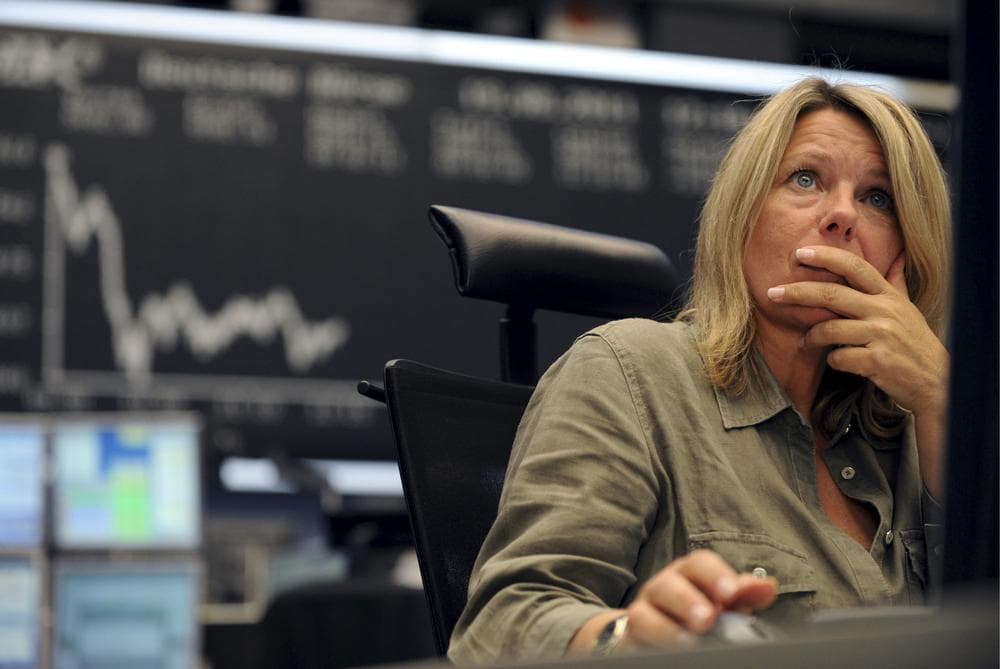Advertisement
World Markets Recoup Worst Losses
Resume
By: THE ASSOCIATED PRESS
MILAN - Global stocks fell again Friday as fears of a possible U.S. recession combined with ongoing worries over Europe's debt crisis, which is stoking acute fears over the continent's banking sector.
However, a better than anticipated opening on Wall Street helped European markets recoup a large chunk of their earlier losses.
"This week has seen a continuation of the trend of weaker than expected data and political reaction to the European problems which pretty much amounts to 'Let's have a get together a couple of times a year,' " said Gary Jenkins, an analyst at Evolution Securities."
Britain's FTSE 100 lost 0.7 percent to 5,056, while Germany's DAX fell 2.1 percent to 5,483. France's CAC-40 was down 1.2 percent at 3,041.
In the U.S., the Dow Jones industrial average was down 0.6 percent at 10,931 while the broader Standard & Poor's 500 index fell 0.1 percent at 1,140. Futures markets had been predicting far bigger declines earlier.
The market turmoil of the last two days has dashed any hopes of a quiet second half of August - a normally quiet period when trading dries up until the U.S. returns from the Labor Day holiday in early September.
Financial markets have wrestled for several weeks with fears that a new recession in the U.S. is in the offing. Another round of soft economic data further spooked investors all round the world. A woeful manufacturing survey Thursday from the Federal Reserve Bank of Philadelphia renewed U.S. recession fears in particular.
A parallel concern centers on Europe after a Franco-German summit earlier this week failed to persuade investors a convincing fix to the spiraling debt crisis was imminent. The leaders promised further economic integration but no concrete measures like eurobonds, which would spread the risk among the 17 nations using the common currency.
Banks have borne the brunt of the selling in the markets on renewed worries of the health of the continent's banks, while safe-haven gold prices nudged up against the $2,000 an ounce mark, and crude prices fell as investors feared a global slowdown will zap demand for crude.
Europe's banks have also been hit by indications from German Chancellor Angela Merkel and French President Nicolas Sarkozy that their countries were developing a plan to tax financial transactions.
In an effort to smooth out that turbulence, France's stock market regulator put in place a ban on short-selling last week, preventing traders from betting on the decline in a share's price. Other European regulators have instituted similar bans.
But on Thursday the Authorite des Marches Financiers eased the ban, saying it would allow traders to roll over - or extend - their short positions when they expired. It will continue to bar them from taking on new ones. It had been unclear before whether traders could roll over positions they'd held before the ban went into effect.
Several countries banned short selling during the financial crisis of 2008 to try to tame volatility. But some experts argued that the bans actually contributed to a feeling of uncertainty since their very existence suggests the system isn't working as it should and limits how traders can respond.
One moderately bright spot for European policymaker remains the relative calm in the bond markets after the European Central Bank started buying up Italian and Spanish bonds. Both countries' yields on their ten-year bonds have fallen over a percentage point to below 5 percent, which is considered manageable.
There's also been some calm in the currency markets, with the euro up 0.9 percent at $1.4423 and the dollar down 0.4 percent at 76.45 yen.
Earlier, Asian shares also took a beating following the big retreat Thursday in Europe and the U.S.
Japan's Nikkei 225 index dropped 2.5 percent to 8,719.24 and Hong Kong's Hang Seng slid 3.1 percent to 19,399.92.
Mainland Chinese shares tracked losses elsewhere, with shares in coal, oil and cement leading the decline. The Shanghai Composite Index lost 1 percent to 2,534.36 after dipping almost 2 percent earlier in the day. The Shenzhen Composite Index lost 0.8 percent to 1,133.84.
Oil prices continued to tank too amid fears over global demand. Benchmark oil for September delivery was down $1.43 to $80.95 a barrel in electronic trading on the New York Mercantile Exchange. Crude fell $5.20, or 5.9 percent.
Guest:
- Mark Gregory, BBC's business reporter
This segment aired on August 19, 2011.